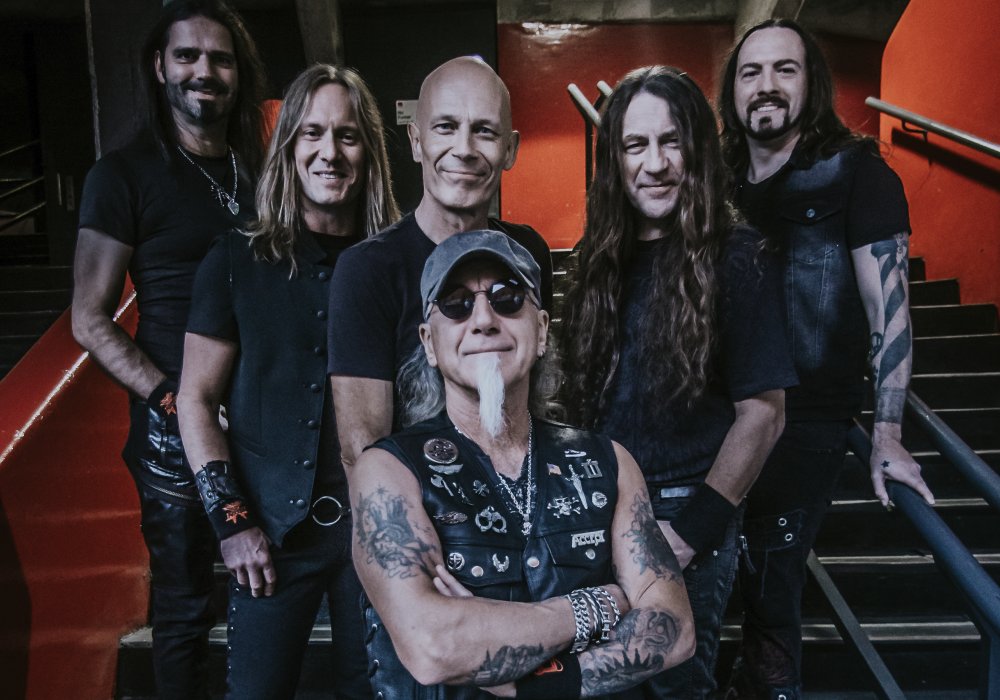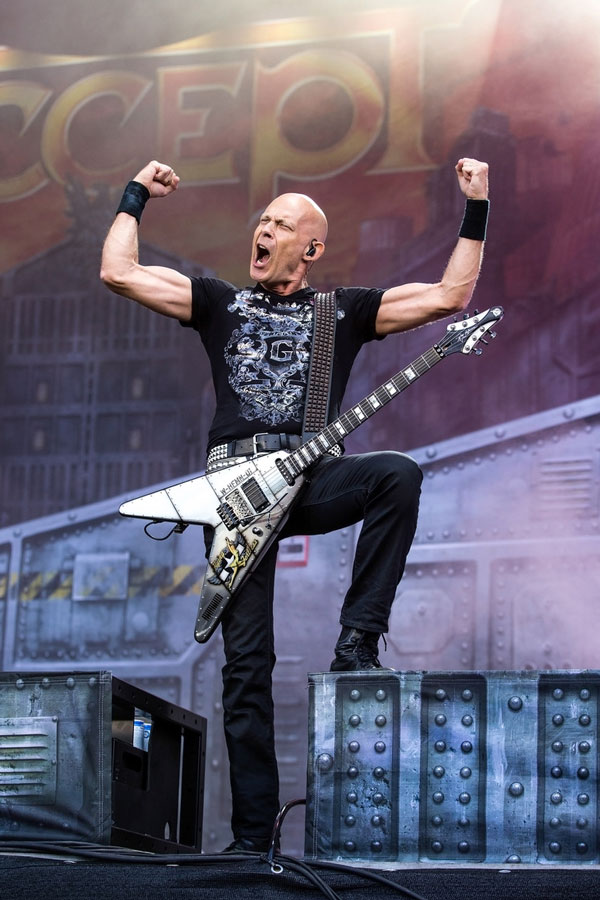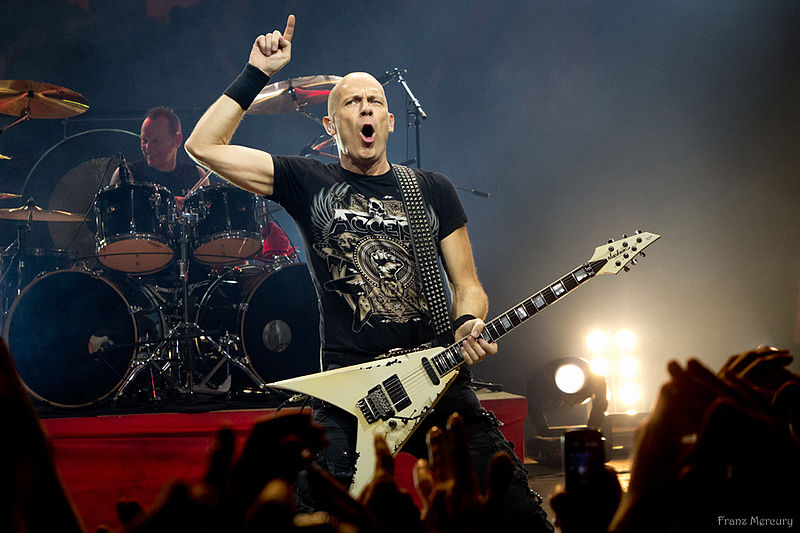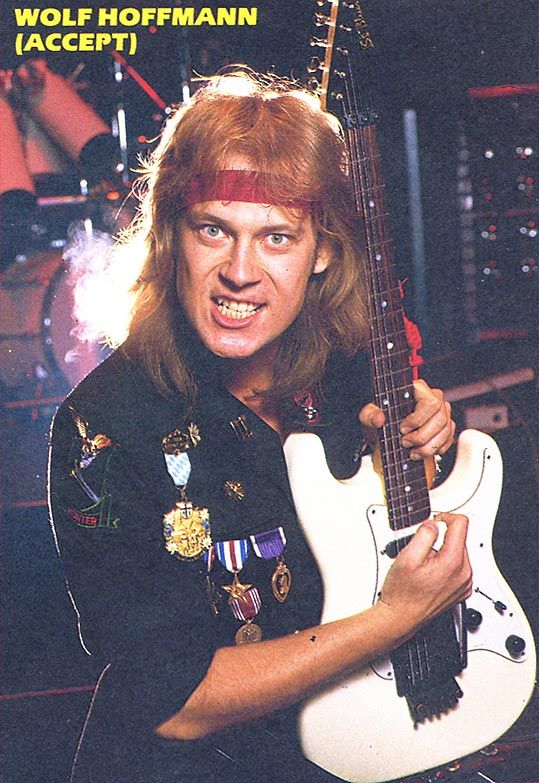
All images courtesy of Continental Concerts

By Andrew DiCecco
[email protected]
Even after enduring nearly five decades of an ever-changing music climate and shepherding his seminal heavy metal band through countless iterations, Accept leader Wolf Hoffmann still grins from ear to ear while playing his signature Framus guitar on stage.
Although Hoffmann is the only member of Accept’s classic lineup left onstage these days, the band remarkably sounds better than ever, largely due to the iconic axe-slinger’s influence on preserving his band’s storied legacy while also incorporating a more modern touch.
With Hoffmann and dynamic frontman Mark Tornillo at the forefront, Accept’s relevance and ingenuity are sublimely demonstrated on 2021’s Too Mean to Die.
In good news for Accept fans worldwide, the band’s new-look lineup – which includes guitarist Philip Shouse, who was recently added to the fold as a permanent member – has yet to exhibit any signs of slowing down.
During one of his off days on tour, Hoffmann recently joined me via phone to discuss, among other topics, Accept’s upcoming North American tour, Too Mean to Die, and the significance of some band’s classic albums.
Andrew:
I appreciate you setting aside some time on an off day, Wolf. With the recent announcement of a North American tour, Accept will now have the opportunity to properly support the release of 2021’s Too Mean to Die. How has Accept been received in North America in the past?
Wolf:
Man, it has changed over the years. I remember in the 80s, when, like, to us, coming from Germany and Europe, America was like the land of milk and honey as far as music, business, touring, and concerts. We were just in heaven because everything was about heavy metal. And then in the 90s and later on, it sort of shifted away a little bit, and then it really gravitated more, for us, towards Europe, because they have all these huge ass festivals and heavy metal never really went away in Europe. So, I have to say, Europe has been more our home turf for these last couple decades, maybe. But lately, I feel like there’s more of a demand in America again. So, I’m glad to announce that we’re finally, after many, many years gonna do a proper American tour.
Andrew:
Have you given any thought to what the setlist might look like?
Wolf:
Oh, yeah. Yeah. We’re in the middle of touring here right now. We’re doing three months of festival touring in Europe right now. So, we get the chance to try out a lot of new songs from this new album, Too Mean to Die. I mean, when you play festivals, a lot of times, you only get to play an hour or ninety minutes, tops. But even there, we throw in a bunch of new tracks, and there’s a ton of them that really work well live. It’s not the typical just one or two tracks. I think there are at least five or six tracks that we end up playing live.
Andrew:
Too Mean to Die was the first Accept album without longtime bassist Peter Baltes. How did the creative process work without him there?
Wolf:
Yeah. I didn’t know how it would turn out to be, because I mean, had been working with Peter for all these years and had become somewhat of a well-oiled machine, or like an old married couple, if you want. We knew each other really, really well. But now that he was gone, I mean, I found it actually also fresh in a way. Our new bass player, Martin Motnik, chimed in a lot; he was a very pleasant surprise as far as like who can contribute what. And, of course, [singer] Mark Tornillo writes a bunch of lyrics. So, it was more of a group effort than ever before, maybe, because a lot of times, it was just Peter and myself, and then a little bit Mark later on. But I think this time around it was different, but equally good.

Andrew:
Do you feel it allowed you more creative freedom than ever before as a result?
Wolf:
I mean, the real creative freedom that we get is because Mark is in the band now for the last five albums or ten or twelve years. He is really a rare find, because he can really represent the old stuff, and play these old, classic songs, which we always do – “Restless and Wild” and “Fast as a Shark” and all these old songs. But at the same time, no matter what kind of song we write nowadays, or I write nowadays, man, he can deliver. This motherfucker is awesome.
Andrew:
Last summer, I attended Accept’s first U.S. show since the pandemic and was blown away by Mark’s stage presence and demeanor.
Wolf:
Yeah. He always delivers live, I really have to say. I mean, I have to say, we’re, right now, almost at the peak of our career, as weird as that sounds. I think we now sound better than ever after forty-plus years. It’s crazy. And the other exciting news that we have, we have three guitar players in the band now; the latest addition – well, not so late anymore – but for two years we had Phil Shouse in our band; an American guitar player from Nashville. We discovered him during our [Symphonic Terror] orchestra tour. So, during this tour, I discovered what an awesome player [Phil] is, and how well we play together, so we asked him to stay on after this tour. And here we are, three guitar players in Accept. That sounds like a killer guitar wall, if you want.
Andrew:
When I saw you live, Wolf, there wasn’t a moment when you weren’t on stage grinning widely and posing for photos. It looked like you were having an absolute blast. With all these years under your belt, do you now have a broader perspective and a deeper appreciation for performing?
Wolf:
Yeah. I mean, I’ve always liked it, but I think now I can appreciate it more because we had somewhat of a longer hiatus, as you know, in the early 2000s. And now that we’re back out there for all these years now and touring the world again, I see what a rare gift it is that we all have, and we should really enjoy it. I really, really do enjoy it, and I take nothing for granted anymore. I have to be honest, in the 80s, we were all super young and I was in my early twenties, and I kind of took it with a certain amount of ease. I somehow didn’t appreciate it as much as I do now. Maybe it’s as you get older, you get wiser, or you can reflect on things more. I almost took it for granted back then, and now I don’t; I cherish every moment on stage. It’s awesome.
Andrew:
If at all, how has your approach to the guitar evolved over the years? For example, your classical influences were evident on Predator.
Wolf:
I’m not sure that it has changed much. I think it has maybe been refined a little bit more. By that, I mean, when you’ve done as many albums as we’ve done and written as many songs, you kind of know what you’re good at and what you’re not so good at, and what you should focus on. And you also dare to do more stuff that you know you’re good at. So, everything becomes a little more refined, maybe, but I don’t think I’ve really changed ever. It’s actually funny, not very often, but time-to-time, I come across an old recording from, say, 1981. Some old concert. You brace yourself, you think, “Oh, God. This is gonna be awful,” but to tell you the truth, it isn’t. So, sometimes, I think like, “I haven’t really learned much in forty years. I still kind of play the same way!” [Laughs]. I don’t think that’s true; I think you do get better, but it’s really not as dramatic as you might think.

Andrew:
During our conversation around the release of Too Mean to Die, Mark mentioned that “Zombie Apocalypse” was a song he’d written and sent to you. You obviously liked it, but he’d said that when you sent it back it was totally different. What alterations did you make to the track to make it what it is now?
Wolf:
I think what he meant is, he sent me lyrics, or a lot of times, he sends me just title ideas, and one of the titles on there was “Zombie Apocalypse.” I messed around with that idea back-and-forth and I couldn’t come up with anything I was happy with until one day I had this riff, and it all clicked eventually, and I sent it back to him. I think, at that point, he thought it was maybe a different vibe-song than he anticipated, but he still liked it a lot. And sometimes, that’s cool; he sent me a complete set of lyrics for “Undertaker” without knowing anything, but I guess, that every time you write some lyrics you maybe have a vibe or a type of song in mind. And he must have had that, too, when he wrote it. But he didn’t give me any music – he just gave me the lyrics – and I wrote the song. Again, it surprised him, and it was awesome, but different from what he expected, maybe.
Andrew:
“Zombie Apocalypse” and “Undertaker” are actually two of my favorite songs from that record. Is there any significance to the fact that Accept opens with “Zombie Apocalypse” live, or is it simply because it’s the track that kicks off the album?
Wolf:
Sometimes, you go through the songs and you try them out, and you see which one is a good opener. “Zombie Apocalypse” has got the intro, and for some reason, has got the right vibe to open up with. You come full force, storming out of the gate with that song. It’s kind of what wanna do when we open a live show. It needs to have the right energy to get people going.
Andrew:
You alluded to it already, but I wanted to follow up on “Undertaker.” Are those lyrics written by Gaby, who, of course, was so instrumental in the songwriting department, or was that Mark’s creation?
Wolf:
On that track, no. She wrote a lot of lyrics over the years, but on this one, no. Like I said, the lyrics were pretty much written by Mark. I mean, not pretty much; he wrote the lyrics as they were; I just wrote the music to it. It was one of those rare instances where the lyrics were there first. A lot of times, we write the music first and then come up with the lyrics after.
Andrew:
What was your amp setup when recording Too Mean to Die?
Wolf:
It hasn’t really changed over the years, especially these last five albums. It’s pretty much identical. I use a Marshall but I play through a Kemper. So, what you hear is a Marshall amp that I’ve had for many, many years. And I also use an EVH 5150, one of the early ones. But I’m playing through a Kemper amp live and in the studio, so you hear the sound of these amps, but it’s actually coming out of the Kemper box.

Andrew:
In the earlier years of Accept, you’ve played either a Gibson Flying V or a Strat. What is your primary guitar of choice these days?
Wolf:
It is a Framus; a German-built, amazing guitar that I’ve had for the last, I don’t know, eight or ten years. It’s my own signature model, it’s called WH-1. And again, the company is called Framus, and they make the dream guitar for me. I haven’t played Gibson guitars in I don’t know how many years because a Gibson is very limited in the way that it is structured. I’ve always liked a Floyd Rose tremolo system and I’ve always liked certain aspects of a Strat, but at the same time, I like the look of a Flying V, so Framus made me the perfect signature model when they incorporated the best of both worlds. It’s a killer guitar. I’m playing nothing else in the studio and on stage.
Andrew:
During your formative years, Wolf, who were some of your most prominent guitar influences and how did they shape your sound?
Wolf:
Well, one of the earliest influences was probably Richie Blackmore, both the lead guitar players from Judas Priest, and Angus Young from ACϟDC was always an influence as well. So, out of those, I think I’ve sort of formed a little element from all of them. Uli Jon Roth has always been one of my heroes as well, of Strat players, basically, that I’ve really admired most. And then for songwriting and the bluesy aspects, I’ve always liked ACϟDC as well. So, I guess, as I was growing up, I listened to all the bands of the 70s, and we formed our own style out of it. My guitar playing was always kind of influenced by classical music. I don’t know why, but I like these sorts of classical touches in my guitar solos and in my songwriting.
Andrew:
Historically speaking, I’ve always considered Breaker to be one of the strongest albums in Accept’s catalog, one that ultimately served as the blueprint for the band’s classic sound. Walk me through your logic in redefining the band’s musical identity.
Wolf:
I do remember that we had experimented on those first albums, a little bit left and right. With Breaker, I think we kind of had enough balls for the first time to say, “You known what? None of this stuff that we did before really worked especially well, and it didn’t really come out the way we wanted it to. So, let’s just do it our way and be a little more daring and ballsy.” So, we did. I think it was the first step into our own style, and we really nailed it with Restless and Wild.
Andrew:
You mentioned Restless and Wild, the follow-up to Breaker, which is an album that is widely considered to represent the birth of thrash metal. Retrospectively, what are your thoughts on the album’s significance?
Wolf:
Yeah, you basically just said it, and a lot of people have said it over the years, that “Fast as a Shark” is maybe the first thrash or speed metal song ever. That’s what most people say nowadays, then looking back, I guess it’s true. Of course, it makes me super proud. At the time, of course, nobody could have known that; we just had a bit of fun. Like I said, we were starting to be pretty daring and not to give a shit anymore what people thought, and what the mainstream was. I mean, back in those days, it was all about radio. It’s hard to imagine nowadays, but back then, it was all, “Oh, you can’t do this. You will never get played on the radio.” So, at that point, during Breaker and Restless and Wild, we said, “Fuck it. We’re just gonna do what we want. If the radio doesn’t play it, so be it. They won’t play it anyhow, no matter what we do, so let’s just have a little fun.” All of a sudden, songs like “Fast as a Shark” were born, because, hey, why not? We didn’t have anything to lose, we felt; we were young and wanted to just do whatever we could to shock the parents and play it as loud as we can.
Andrew:
Aside from being iconic, the song “Balls to the Wall” contains one of my all-time favorite riffs. As one of the architects, how did that track come together?
Wolf:
“Balls to the Wall” was a scary track because it came together in minutes, I have to say. The title was there, and I guess that came from Gaby back then. She had seen it in a magazine article, where somebody in Kerrang! Magazine called the band “balls to the wall.” And we had never heard that term, but it sounded cool, and it was provocative, so she basically said, “Hey, here’s a cool title: ‘Balls to the Wall.’” You know, I thought about it, and all of a sudden I had this riff, and I had the melody and the chorus. It was just a few parts missing, but I brought it to the band, and within five minutes, it was done. It was scary.
Andrew:
At the time of recording, did you have any idea that song would be a hit?
Wolf:
Not that it was gonna be a hit, but it was this scary feeling, like, “I mean, this is pretty damn good. Is that really our idea, or did this exist already?” Because it just fell in place so easily – like I said, within minutes – I thought, “Are we tricking ourselves? Are we playing somebody else’s song?” Sometimes, believe it or not, when you write songs, this happens, because you’ve heard something in the back of your mind, and you start noodling around – you just start jamming – and then you write somebody else’s song again. But it wasn’t, obviously.

Andrew:
The album also garnered attention for its…cover art. Was that person in the photo a member of the band?
Wolf:
No, no, no. It was supposed to be an artsy cover. I think it was inspired by, there was a photo by Robert Mapplethorpe, and I think that was the inspiration for it. Something artsy and classy.
Andrew:
It still proved to be an iconic one, nonetheless.
Wolf:
It did. And actually, it became quite controversial. I didn’t know, if I may say so, how narrow-minded the US market is in that regard. To Europeans, it was just a leg. Whatever. It looked cool. But for Americans, it’s like, “Oh my God. It’s so weird. The guy has hairy legs.”
Andrew:
As its quite varied sonically, I also wanted to ask you about Metal Heart. Was there anyone or anything that influenced you during that time?
Wolf:
Yeah. We produced Balls to the Wall, and also Restless [and Wild] ourselves, and back in the 80s, there were all these legendary producers that made these bands famous. So, they said, “Well, if you guys would work with a top-notch producer, lots of doors would open up for you.” And that legendary producer was supposed to be Dieter Dierks, who had worked with the Scorpions. So, he worked on that album with us, and I have to give him credit, we did learn a lot from him, and we made a great album together. We really did. I think that is probably the reason why there are a lot of stylistic changes and it became a little more polished or whatever. You know, songs like “Metal Heart,” “Midnight Mover,” and things like that, they certainly became a little more radio-friendly, if you want.
Andrew:
Where did your passion for photography originally stem from, and how did it ultimately evolve from a hobby into a second career over the years?
Wolf:
Well, I started taking pictures on the road when we were touring so much and I started to see the world. You know, I started doing touristy pictures like everybody else and from there, it developed into a passion and almost like an obsession. I just was fascinated by the process. I started to have a dark room and developing my own film and really got into it. And then one day in the 90s, when the band came to end like I said earlier, I thought to myself, “Why don’t I give my second passion a serious go? Why don’t I give it a chance and see what I can do with it?” I was a little tired of the music business at that point, and I became a professional photographer for all those years. I really did enjoy it, but honestly, does it give me the same satisfaction as playing music on stage? Hell no. And I don’t think there’s anything in life that can do that, that’s why they say, “Once a musician, you’re always a musician.” Because it’s almost like a drug; you want it again and again. I haven’t found anything in life that comes close to it.
Andrew:
Another fascinating element of your career is that you’ve released two outstanding solo albums, Classical and Headbangers Symphony. Now, the latter was released back in 2016, but did the extended downtime perhaps spark your desire to release a third installment?
Wolf:
Yes, it did, and I started working on some tracks here and there. But to tell you the honest truth, this whole pandemic time was not my most creative time. The whole lockdown started, and we were in the middle of recording Too Mean to Die, so for a few months, we were kind of glad, “Oh, now we have time and don’t have to worry. We can really take our time with this album.” Because touring’s gonna start in – we thought, maybe in six months everything was gonna be open – but then six months came, and nothing was open. Then we thought, “Oh, OK, well maybe this tour is just postponed for another six months or a year.” And then that time came, and it was again postponed. So, it was always like this hurry-up-and-wait kind of thing. Almost like you’re sitting at an airport, and you think that the flight’s gonna take off in thirty minutes, and then thirty minutes comes around, and it’s gonna be another thirty minutes and another hour. That’s how it felt to me. It was never like, “Oh, you’ve got two years off now. So, take your time and be creative.” It was just weird, man. It was a weird time for me.

Andrew:
What is the current status of that album?
Wolf:
It’s in the process, and I’ve laid down some tracks and some ideas and stuff. But right now, for me, my focus is on Accept and finishing this tour. We haven’t really toured for this latest album, and that’s what I really wanna get out of my system first. So, I can’t wait to be on the road with Accept again and properly tour this album. When the time comes, I will definitely go into the studio and work on another classical album. But these things take time. I mean, working on this classical stuff is really, really time-consuming.
Andrew:
What are your thoughts regarding the future of rock music from your perspective, Wolf? Where do you see it going?
Wolf:
It’s an ever-evolving, ever-changing field of music. I don’t really know where it’s gonna go, because I’ve seen so many changes, from the 70s to the 80s, and nowadays, there are still bands out there, but they seem to have a different focus almost. You know, a lot of bands are using tracks live, they’re using theatrical stuff, so it’s going away from a purely playing-your-instruments kind of show to more of a spectacle kind of thing if you know what I mean. I don’t know where it’s gonna go, maybe it’s gonna come full circle and people are rediscovering handmade, solid live music again. And this is what we do; what you see is what you get. We go out there and we play our instruments, we don’t have any gimmicks, we don’t do any tracks and none that stuff. We really go out there, like we did all these years ago, and give it all we’ve got.
Andrew:
The use of pre-recorded vocal tracks has become a hot-button topic in music today, which is a sad reality. I greatly respect the authenticity of bands like Accept, because I believe a live show should be exactly that. Where do you land on that?
Wolf:
I know. And I don’t know what to think of it. If the audience likes it, hey, why not? It’s a free world, let them do whatever they want. If the audience enjoys it, fine with me. I wouldn’t wanna do it, because we were brought up with that sort of built-in pride, and it’s not what you do. But if it works for bands and people like it, then, hey, who am I to judge? Let them do what they want. But it’s not for us.
Andrew:
Thanks for the time, Wolf. Last one. Accept is on the road right now, but will you be actively writing in anticipation of a new record?
Wolf:
Yeah. We just signed a new deal with Napalm Records and they’re desperately waiting for a new album. We are currently working on new tracks. While we’re on the road, I sit with my guitar in my room and shred away, you know, collecting new ideas. Absolutely.
– Andrew DiCecco (@ADiCeccoNFL) is the Senior Editor for vwmusicrocks.com and may be reached at [email protected].

3 thoughts on “An Interview with Wolf Hoffmann of Accept”